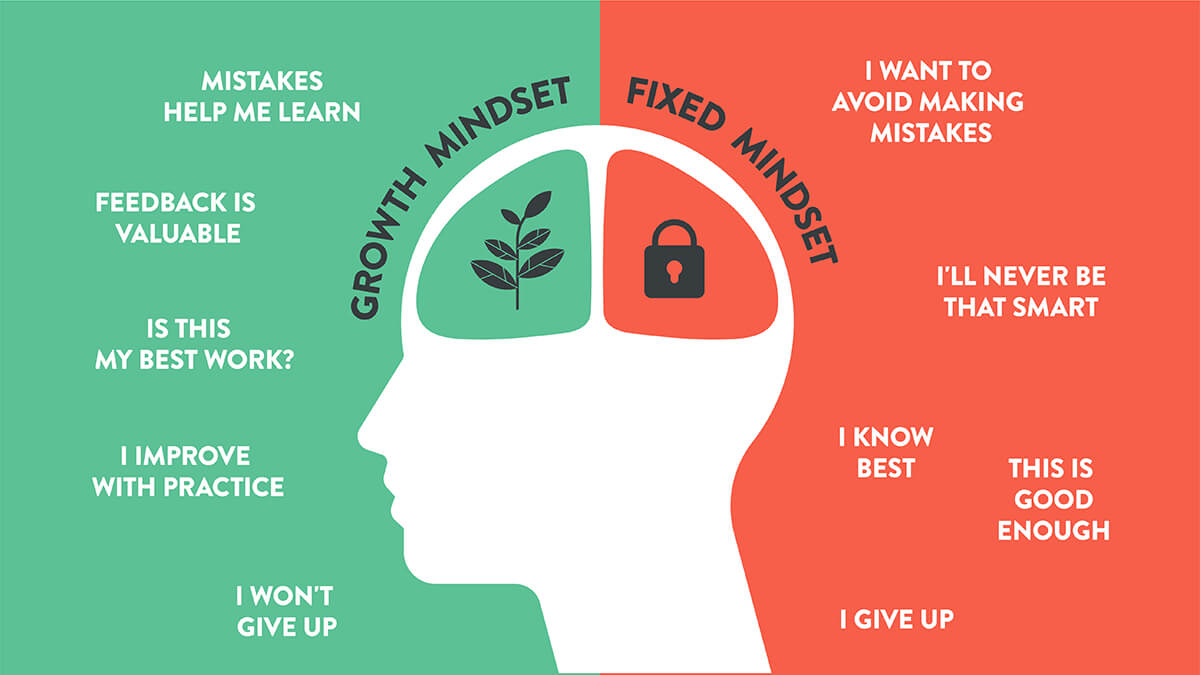Organizations have long recognized mentoring as one of the most effective ways to develop talent. Mentorships create powerful learning environments offering knowledge, guidance and support. The integration of growth mindset coaching into mentoring programs has emerged as an approach that amplifies these outcomes, accelerating learning, creating more resilient professionals and improving professional performance.
Definition: What Is a Growth Mindset?
At its core, a growth mindset represents the belief that abilities can be developed through effort, with challenges seen as learning opportunities. This contrasts with a fixed mindset, which assumes that basic qualities such as ability and intelligence are static and can’t be meaningfully changed.
Growth vs. Fixed Mindset
Stanford psychologist Carol Dweck introduced the concept of growth mindset in her groundbreaking book, “Mindset: The New Psychology of Success.” In contrast, people with a fixed mindset believe their basic characteristics are unchangeable.
Growth mindset is an approach that helps individuals work through challenges and setbacks. Studies show that students using this approach perform better than their counterparts with fixed mindsets, particularly when facing difficult situations. Those using a positive approach see difficult tasks as ways to improve skills and actively seek out challenging development experiences, which results in better grades, especially among lower-achieving students.
In the workplace, employees with fixed mindsets may avoid challenging projects and view feedback as criticism of their abilities rather than a chance for personal development. In contrast, people with a growth mindset actively seek out feedback and persist through difficulties because they understand that effort can result in improved skills and capabilities.
What Best Describes a Growth Mindset?
A growth mindset approach is characterized by several key factors. People using this approach::
- Show curiosity and willingness to explore new ideas and possibilities
- Embrace challenges as opportunities for self-improvement
- Persist after setbacks
- Actively seek feedback and effectively use it to improve
- Are goal-oriented and highly motivated to achieve
The human brain has the ability to form new connections throughout life. This is known as neuroplasticity, and it means people can rewire their thinking patterns and abilities. A growth mindset reflects the reality that everyone can develop and change behavior for the better.
How Growth Mindset Interacts With Mentoring
When growth mindset principles are brought to mentorships, the ability to grow is a given, challenges and obstacles are seen as opportunities and constructive feedback is used as a powerful tool. Characteristics include:
Shared learning goals: The mentor and mentee commit to achieving goals together, creating a partnership where both people grow.
Psychological safety: Mentors create safety by sharing their own learning struggles in difficult situations, normalizing that it’s difficult to acquire new skills and responding to mistakes with curiosity so mentees feel safe to experiment and potentially fail.
Reflective Dialogue: Regular reflection on both successes and setbacks helps mentees develop self-awareness.
Accountability Practices: Structured accountability relies on regular check-ins and mutual investment. Accountability is supportive rather than punitive, helping mentees stay committed to personal development and get the help they need while celebrating small wins along the way.
Growth Mindset + Mentoring = Results
The marriage of growth principles and mentoring creates synergy to move the mentee away from limiting belief. The mentor provides structure, guidance and expertise, while growth mindset principles fuel the drive, resilience and adaptability that drive meaningful change. This approach helps leaders address critical organizational needs:
- Boosting skill transfer rates by encouraging mentees to approach learning with curiosity rather than fear of failure
- Building resilience by teaching individuals that setbacks are opportunities for personal growth
- Fostering inclusive performance cultures where where everyone can progress, regardless of their starting point
Core Principles of Growth Mindset (Behaviors to Cultivate)
A growth mindset is more than just a positive attitude; it’s the motivation for behaviors that can be learned and practiced. These core principles provide a roadmap to help individuals move beyond limiting beliefs to positive action.
Challenge Limiting Beliefs > Reframe Self-Talk
A fixed mindset is expressed in the way people talk about themselves. Phrases like “I’m not a math person” or “I’m just not creative” signal fixed-mindset thinking, but individuals can learn to replace these statements with empowering, learning-oriented language such as “I can improve my skills with practice and support.” This goes beyond language to demonstrate a real shift in how people see their relationship with their abilities.
Embrace Challenges & Learn From Failure
In a growth mindset approach, setbacks are reframed as valuable data rather than personal failures. Using “what worked / what didn’t / what next” reflection loops can help individuals extract learning from every experience. Small, frequent practice sessions reduce the psychological risk of trying new things. And publicly sharing lessons learned can help normalize the iterative process, demonstrating that struggle and adjustment are natural parts of skill development.
Focus on Effort & Process (Not Just Outcomes)
Growth mindsets don’t just focus on outcomes; dedication, work and the learning process are also important. This means goals and milestones should be visible through tools such as checklists and regular check-ins. This approach celebrates progress along the way, building motivation and resilience. Challenges should be difficult enough to foster progress but not overwhelming. When someone gets stuck because the challenge was not set at the right level, it’s OK to adjust the goal.
Seek & Use Feedback
With a growth mindset approach, feedback transforms from a dreaded ordeal to a valuable source of learning. Steps to achieve this include:
- Schedule feedback requests in advance and ask for a detailed critique rather than general comments
- Make feedback part of a reflect-decide-act cycle, taking action based on constructive criticism and continually evaluating progress
- Model good feedback practices, including thanking feedback providers, asking for specific examples and confirming next steps.
Promote Self-Reflection & Self-Awareness
Regular self-reflection enables people to deepen self-awareness, practiced in actions such as five-minute post-task reviews to examine trigger, response, lesson and adjustment. Tracking mindset triggers helps people recognize patterns such as “When deadlines get tight, I avoid asking questions.” These can then be consciously addressed. Another valuable practice is keeping a journal of experiments and outcomes to create a personal learning database.
Growth Mindset Benefits Leaders Care About
Integrating growth mindset coaching into mentoring programs creates improvements that directly impact business results. Companies see benefits across these key areas.
Motivation & Resilience
Using a growth approach helps people face challenges with determination rather than resignation. This leads to greater perseverance under pressure and stronger confidence during role transitions as employees perceive difficult situations as solvable challenges that they can learn from.
Performance & Satisfaction
Research reveals that a growth mindset can be an important tool for achievement. Approaching challenges with the idea that you can learn, grow and find solutions to obstacles cultivates experimentation and high standards and boosts performance. Those using a growth mindset also have higher job satisfaction, with a virtuous cycle of overcoming challenges, improving skills and enjoying new knowledge.
Collaboration & Communication
Growth mindset-oriented language improves feedback quality across teams. A culture that values honest feedback and offers the tools to express it empowers teams to engage more openly and productively.
Innovation & Continuous Improvement
Employing a growth mindset approach encourages curiosity and exploration, supporting hypothesis testing and faster learning cycles. Rapid iteration diminishes risk as adjustments can be made quickly. As employees become more willing to experiment and learn from both successes and failures, organizations benefit from increased innovation.
Where Growth Mindset Shows Up in Work (Mentoring Use Cases)
Growth mindset mentoring proves most valuable when applied to specific workplace situations where people face uncertainty, challenge or the need to develop new capabilities. Use cases include:
Onboarding & Role Ramp
New employees often struggle in their first 90 days and can interpret normal challenges as signs they’re not cut out for the role. Mentors can help normalize this struggle via regular reflection prompts, encouraging mentees to reframe challenges as learning. Mentors should tie learning goals and practice exercises to real work tasks to reinforce the idea that mentees can achieve if they put in the work.
Career Transitions & Promotions
Workers moving into new roles often experience imposter syndrome. Growth mindset mentoring reframes these doubts by treating skill gaps as chances to develop. Mentees build confidence through small wins and progressively challenging assignments that demonstrate growing capabilities.
Leadership & People Management
Positive modeling is one of the best ways for mentees to learn what leadership looks like. Effective mentors demonstrate positive behaviors such as seeking feedback from mentees and adjusting accordingly. Mentors make it clear that process is key to results by recognizing successes and development opportunities throughout the mentoring journey.
Cross-Functional Projects & Innovation Sprints
When effective collaboration, idea generation and intensive performance are the goals, growth mindset mentoring can help team members select appropriate challenges and establish regular iteration cycles. With this approach, teams aren’t afraid of making mistakes and have the confidence to share lessons learned for the benefit of the group.
Performance Conversations
Growth mindset mentoring shifts performance conversations away from fixed-mindset judgment of past behavior to a focus on future improvement. Mentors use this to help mentees plan next steps.
Criticisms & Guardrails (Use Mindset Science Responsibly)
The growth mindset approach is a tool for specific situations, not a cure-all. It’s important for practitioners to understand what growth mindset really means and how to use it effectively, ethically and responsibly.
Known Critiques
While research shows that growth mindset interventions can make a difference in performance, the average effect is relatively small, with considerable variation across different contexts and populations.
Growth mindset is also often misunderstood. Carol Dweck has emphasized that growth mindset is not a permanent state of being but rather a context-specific coping strategy most appropriate when facing uncertainty and challenges. She maintains that everyone uses a mix of growth and fixed mindsets and cautions against oversimplified interpretations that reduce growth mindset to mere positive thinking.
Avoid Toxic Positivity & One-Size-Fits-All
Responsible growth mindset mentoring leverages valuable resources, adequate time and proper training for long-term change. Rather than hyping a “can-do” attitude as a universal solution that can surmount all obstacles, mentors need to understand mentees’ unique circumstances, acknowledge real constraints and work to remove systemic barriers rather than placing all responsibility on individual effort.
Ethical Communication
Growth mindset mentors have an ethical obligation to be honest and transparent with their mentees. They praise effective strategies and measurable progress rather than effort or attitude alone. They also make expectations and available support clear so mentees have a clear understanding of what they need to do and how to get help.
Make Mentoring More Impactful with Growth Mindset Coaching
Growth mindset coaching can amplify the impact of mentoring with intentional structure and tools. Successful mentors build touchpoints, conversations and systems that reinforce growth mindset principles.
Map Mindset to Mentoring Moments
Growth mindset principles can be paired with the different phases of mentoring. For example:
- First Meeting: Establish a “growth pact” where both mentor and mentee commit to personal development. Setting shared goals emphasizes that learning goes both ways.
- Mid-Journey: Implement feedback sprints, structured sessions for practicing requesting and using feedback. “Failure flip” exercises can help mentees change their perspective on setbacks by identifying lessons learned and actionable next steps.
- Closing: Document the learning trajectory and identify further experiments the mentee can pursue independently, ensuring continued progress.
Conversation Starters & Exercises
Conversation starters and exercises are useful tools for mentors to get the ball rolling. Ideas include:
- “How can I develop a growth mindset?” This question leads to techniques such as helping mentees identify fixed-mindset moments and practice reframing them with growth-oriented language
- “How do I move from fixed to growth in this specific skill?” This question offers an opportunity for the mentee to change focus from feeling defeated to coming up with a strategy to break down complex skills into smaller components and identify next steps
- Structured reflection: This exercise uses a three-step cycle of reflecting on what happened, making a plan for trying something new and reviewing progress to adjust approach
- Effort/process scoreboard: Track habits and actions weekly along with outcomes. Celebrate progress markers publicly to reinforce growth-oriented behaviors.
- Feedback protocol: Follow a structured feedback process of request, receive, reflect and act. Follow through to close the loop in subsequent sessions.
Chronus Guided Conversations offers multiple pre-built meeting agendas, prompts and discussions that can be integrated into the mentoring journey.
Measurement & ROI (Mindset, Behavior & Results)
Mentoring progress can be measured in several different ways to demonstrate impact and guide continuous improvement. This progression from mindset shifts to behavioral changes to business results provides a clear framework for tracking return on investment. Mentoring platforms such as Chronus provide metric tracking as part of comprehensive mentoring program administration. For a case study example, check out our Amazon mentoring programs case study.
Leading Indicators
Leading indicators help identify potential issues before they impact outcomes and provide early warning signs when mentorships need additional support. These include:
- Activation rate: The percentage of matched participants who actually begin their mentoring relationship
- Time to first meeting: How quickly pairs move from match to meaningful conversation
- Agenda utilization: Which conversation topics and prompts are used most frequently
- Session sentiment: Feedback on meeting quality and participant satisfaction
Behavioral Outcomes
Behavioral changes serve as proof points that growth thinking is translating into real workplace actions. Metrics include:
- Feedback requests and quality: How often mentees seek input and the quality of feedback
- Experiment counts: The number of new approaches or plans participants try
- “Failure flips” logged: Instances where setbacks are reframed as learning opportunities
- Goal and action completion rates: Follow-through on commitments made during mentoring sessions
Business Results
These results connect mentoring investments directly to organizational impact. Metrics include:
- Faster ramp time: Reduced time for new hires to reach full productivity
- Internal mobility: Increased rates of promotion and lateral movement
- Performance improvements: Enhanced results and goal achievement
- Retention gains: Lower turnover rates among program participants
- Increased engagement: Higher employee satisfaction and commitment scores
Guided Conversations by Chronus: Operationalize Growth Mindset at Scale
Mentoring isn’t easy, and organizational structure and support can make a big difference to both mentors and mentees. Chronus Guided Conversations addresses this challenge, providing intuitive, in-app structured prompts and actionable discussions to anchor mentorships. They’re key to helping mentoring participants engage, connect and stay on track as part of a systematic approach that scales across organizations. This tool leads to real results:
- More than 80% of users stay engaged after matching
- 82% of users complete conversation actions
- 98% of users said the experience was helpful
Customizable Guided Agendas (500+ Topics)
Chronus Guided Conversations provides ready-to-use, interactive meeting agendas, with specific content tracks for onboarding, new managers and leadership development. Managers can also align agendas to role, level and program goals. Organizations can customize content to integrate growth mindset principles directly into these frameworks, ensuring consistent messaging and approach across all mentoring relationships.
In-Platform Prompts Reduce Prep
Built-in conversation starters, reflection cues and progress check-ins reduce the preparation burden on mentors while maintaining high engagement rates. This structured approach helps mentoring pairs move quickly to meaningful conversations and maintain regular meeting schedules throughout their relationship.
Notes, Goals & Tasks > From Talk to Outcomes
Each mentoring session generates shared documentation including notes, goals and action items. Pre-built templates guide mentees through practice exercises and reflection cycles, creating accountability that transforms discussions into measurable progress.
Reporting & Sentiment
Chronus offers mentoring program administrators real-time visibility into mentorship quality with meeting satisfaction tracking. Dashboards display data on engagement metrics and satisfaction scores, offering early warning indicators for mentoring relationships that may need extra support. These insights demonstrate concrete value to organizational stakeholders and help program managers optimize their approach.
See How Our Real-Time Guidance System Automates Growth Mindset
A growth mindset approach offers clear advantages for employees dealing with challenges, feedback and skill development. When people believe their abilities can be developed through consistent effort and learning, they become more resilient and willing to take on stretch assignments and their performance improves.
Scaling growth mindset development across an organization requires systematic approaches that provide consistent guidance and measurable progress tracking. Chronus Guided Conversations automates this process, embedding growth mindset coaching directly into your mentoring program framework.
Demo Chronus Guided Conversations
Ready to see how structured guidance transforms mentoring outcomes? Request a demo to explore how Chronus Guided Conversations helps mentors effectively foster growth mindset principles across your organization while delivering measurable business results.




